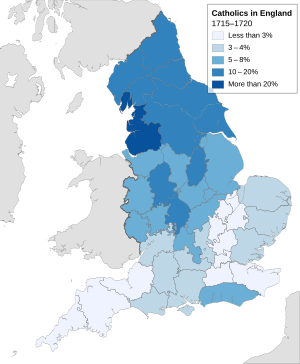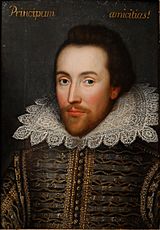Recusancy facts for kids

Recusancy (from Latin: recusare, lit. 'to refuse') was a term for people in England who refused to attend services of the Church of England. This happened after the English Reformation, when England changed its official religion. Most recusants were loyal to the Catholic Church.
Laws called the Recusancy Acts were passed in the time of Elizabeth I. These laws punished recusants with fines, taking away their property, or putting them in prison. Some Catholics even faced the death penalty. Many English and Welsh Catholics who were executed in the 1500s and 1600s are now honored by the Catholic Church as martyrs.
These laws stayed in place for a long time, until 1888. Even after most restrictions were lifted for Protestants, some rules against Catholics lasted until the 1920s.
Contents
What Was Recusancy?
The word recusant comes from a Latin word meaning "to refuse" or "to object." Today, it often refers to the families of Roman Catholic gentry (upper-class landowners) and aristocracy (nobles) in Britain.
Why Did Recusancy Happen?
After the English Reformation in the 1500s, England's official religion changed. Everyone was expected to follow the new Church of England. However, many people, especially Catholics, did not want to give up their faith.
From the 16th to the 19th century, those who did not follow the official religion were called "recusants." They faced civil penalties, meaning they lost certain rights. Sometimes, especially in earlier times, they faced criminal punishments.
At first, the term "recusant" mainly applied to Catholics. Later, other Protestant groups who disagreed with the Church of England were also called "recusants." These groups were later known as "nonconformists" or "dissenters."
Laws Against Recusants
The first law against religious dissent was made in 1593 under Queen Elizabeth I. It was specifically aimed at Catholics and called "An Act for restraining Popish recusants." This law said that "Popish recusants" were people who were found guilty of:
not going to a Church, Chapel, or usual place of Common Prayer to hear Divine Service there, but avoiding it against the laws made before.
Other laws were passed under kings James I and Charles I. These laws added more punishments for recusants. They faced many civil disabilities, which meant they couldn't do certain things, like hold public office. Most of these laws were removed between 1811 and 1830.
Protestant dissenters were largely excused by the Act of Toleration 1689 in 1689. However, Catholics were not fully freed from these laws until 1829.
Famous Recusant Families and Individuals
Recusant Families
Many noble families remained Catholic despite the laws. For example, the Howard family, which includes the Dukes of Norfolk, is the highest-ranking non-royal family in England. They are considered the most important Catholic family in England.
Historically, recusancy was common in Northern England, especially in areas like Cumberland, Lancashire, Yorkshire, and Westmoreland. The Weld family, originally from Shropshire, also became a well-known recusant family. They married into other important Catholic families across the kingdom. The Acton family is another famous recusant family.
Individuals

The famous writer William Shakespeare (1564–1616) and his close family officially belonged to the Church of England. However, Shakespeare's mother, Mary Arden, came from a very strong Catholic family in Warwickshire.
Some historians believe that several of Shakespeare's family members were secretly Catholic recusants. There is some evidence, like a document supposedly signed by John Shakespeare, William's father, saying he was secretly Catholic. This document was later lost, and some scholars think it might have been a fake. However, John Shakespeare was listed as someone who didn't go to church, but this was officially because he was trying to avoid being arrested for debt, not because he was a recusant.
Another important English Catholic was the composer William Byrd. Some of his famous songs were actually secret messages to his friend, composer Philippe de Monte. Their songs often talked about being oppressed or hoping for freedom.
The poet John Donne was also born into a recusant Catholic family. However, he later wrote writings that supported Protestant ideas. King James I even asked him to become a priest in the Church of England.
Guy Fawkes, an Englishman and soldier, was arrested with other recusants for trying to blow up Parliament on November 5, 1605. This event is known as the Gunpowder Plot. Most of the plotters were recusants or converts to Catholicism. They were tried and executed.
Recusancy in Other Countries
The term "recusancy" mostly refers to Catholics in England, Scotland, and Wales. However, similar situations happened elsewhere. Most Irish people, for example, stayed loyal to the Roman Catholic Church even though they were ruled by the British crown. They faced similar punishments as recusants in Great Britain.
In Scandinavia, recusancy did not last long after the Reformation. Anti-Catholic feelings lessened in the late 1700s, and religious freedom was established in the mid-1800s. Some notable converts to Catholicism in Scandinavia include Christina, Queen of Sweden, and Nobel Prize-winning author Sigrid Undset.
See also
- Catholic Church in the United Kingdom
- Catholic Church in England and Wales
- Catholic Church in Scotland
- Dissenter
- English Dissenters
- Nonconformism
- Priest hole
- Catholic Church in Ireland
- Recusancy in Ireland
 | Chris Smalls |
 | Fred Hampton |
 | Ralph Abernathy |

